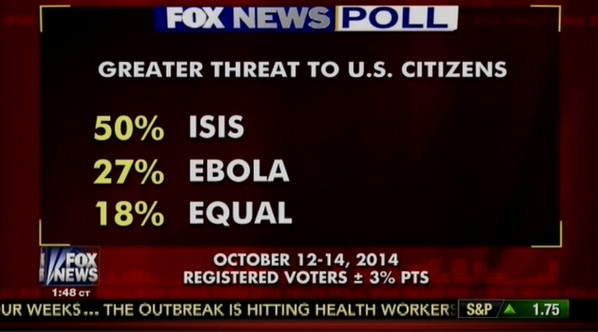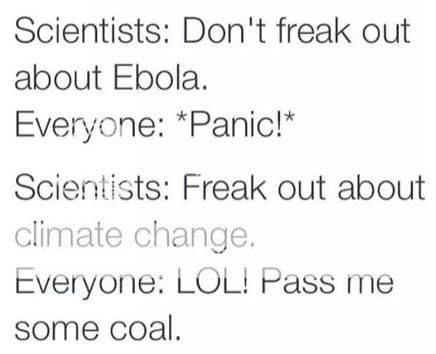Star
Gold Member
- Apr 5, 2009
- 2,532
- 614
- 190
.
I edited out much of the article and left in the "How freaked out should you be:" about threats to Americans portion of the article - click the link for the whole article.
Threats to Americans, ranked (by actual threat instead of media hype)
Updated by Max Fisher on October 17, 2014
Americans are inundated with media coverage and politicians warning them of dire threats: Ebola, the Islamic State of Iraq and Syria (ISIS), the war on Christmas.
The truth, though, is that the most-hyped threats are often not actually that threatening to Americans, while larger dangers go mostly ignored. That should tell you something about how our political system and media can distort threats, leading Americans to overreact to minor dangers while ignoring the big, challenging, divisive problems — like climate change — that we should actually be worried about.

An actual poll featured on Fox News (Nick Martin)
Obsessing about possible threats is something of a beloved national past-time here in America, which is objectively one of the safest places on Earth, so we want to help you do it right. Here, then, is a highly un-scientific and incomplete ranking of threats to the United States — sorted by the current danger to Americans, worst-case danger to Americans, and how freaked out you should be.
9) Ebola
How freaked out should you be: If you have loved ones in Liberia, Sierra Leone, or Guinea, it is not unreasonable to urge them to take all possible precautions. Otherwise, you would do better to worry about the other items on this list.
8) Your own furniture
How freaked out should you be: Council on Foreign Relations scholar Micah Zenko found that tip-over kills about as many Americans per year as terrorism does, and injures many more. In theory, then, you should be just as freaked out by tip-over as you are by terrorism. Based on the fatality rate, you should be much more freaked out about tip-over than you are about Ebola.
7) ISIS
How freaked out should you be: Not very. If ISIS decides to turn its attention to attacking the US, the prospect it might succeed is real, but remote. And even if it did pull off a successful attack, it would almost certainly kill only a small fraction of the number of Americans that guns and cars are virtually certain to kill every single year.
6) The flu
How freaked out should you be: If you're elderly, very young, or immunosuppressed, you should get a flu shot or nasal spray immediately. (Even if you're not, you should still get off your lazy butt and get a flu shot, unless you are some kind of monster who doesn't care about herd immunity.) But if you're young and otherwise healthy, you'll probably be fine even if you do catch the flu.
5) World War III breaking out in the Baltics
How freaked out should you be: To be very clear: the odds of this happening are extremely low. But the danger is real enough that everyone is taking it seriously (Russia is holding major nuclear exercises). If it did happen, it would be many, many times worse than every other item on this list combined.
4) Climate change
How freaked out should you be: If you care about the world your kids and grandkids will grow up in, pretty freaked out. Averting disaster requires immediate, massive, global cuts to carbon emissions. With the US and China particularly dragging their feet, it may simply be too late.
3) Guns
How freaked out should you be: It all depends on whether you see America's uniquely permissive gun laws as worth the trade-off. But you — and, yes, your children — are at risk, regardless of your views about gun regulations.
2) Traffic accidents
How freaked out should you be: The motor vehicle death rate is declining, but getting in your car is still dangerous. Stay alert and don't drink.
1) Heart disease and cancer (tie)
Danger to Americans: The number-one and number-two killers in the US, collectively responsible for just over 50 percent of all American deaths.
Worst-case scenario: These could become even deadlier as Americans get unhealthier. Heart disease correlates with rising obesity. Cancer rates also correlate with obesity, smoking, and other unhealthy practices.
How freaked out should you be: The odds are that one of these two things will kill you, so you should be thinking about this. The good news: it's pretty easy to reduce that risk by making healthy lifestyle choices and screening regularly for cancer. Much easier for any given American, at least, than combatting West African Ebola outbreaks or Middle Eastern terrorist groups.
.
I edited out much of the article and left in the "How freaked out should you be:" about threats to Americans portion of the article - click the link for the whole article.
Threats to Americans, ranked (by actual threat instead of media hype)
Updated by Max Fisher on October 17, 2014
Americans are inundated with media coverage and politicians warning them of dire threats: Ebola, the Islamic State of Iraq and Syria (ISIS), the war on Christmas.
The truth, though, is that the most-hyped threats are often not actually that threatening to Americans, while larger dangers go mostly ignored. That should tell you something about how our political system and media can distort threats, leading Americans to overreact to minor dangers while ignoring the big, challenging, divisive problems — like climate change — that we should actually be worried about.

Obsessing about possible threats is something of a beloved national past-time here in America, which is objectively one of the safest places on Earth, so we want to help you do it right. Here, then, is a highly un-scientific and incomplete ranking of threats to the United States — sorted by the current danger to Americans, worst-case danger to Americans, and how freaked out you should be.
9) Ebola
How freaked out should you be: If you have loved ones in Liberia, Sierra Leone, or Guinea, it is not unreasonable to urge them to take all possible precautions. Otherwise, you would do better to worry about the other items on this list.
8) Your own furniture
How freaked out should you be: Council on Foreign Relations scholar Micah Zenko found that tip-over kills about as many Americans per year as terrorism does, and injures many more. In theory, then, you should be just as freaked out by tip-over as you are by terrorism. Based on the fatality rate, you should be much more freaked out about tip-over than you are about Ebola.
7) ISIS
How freaked out should you be: Not very. If ISIS decides to turn its attention to attacking the US, the prospect it might succeed is real, but remote. And even if it did pull off a successful attack, it would almost certainly kill only a small fraction of the number of Americans that guns and cars are virtually certain to kill every single year.
6) The flu
How freaked out should you be: If you're elderly, very young, or immunosuppressed, you should get a flu shot or nasal spray immediately. (Even if you're not, you should still get off your lazy butt and get a flu shot, unless you are some kind of monster who doesn't care about herd immunity.) But if you're young and otherwise healthy, you'll probably be fine even if you do catch the flu.
5) World War III breaking out in the Baltics
How freaked out should you be: To be very clear: the odds of this happening are extremely low. But the danger is real enough that everyone is taking it seriously (Russia is holding major nuclear exercises). If it did happen, it would be many, many times worse than every other item on this list combined.
4) Climate change
How freaked out should you be: If you care about the world your kids and grandkids will grow up in, pretty freaked out. Averting disaster requires immediate, massive, global cuts to carbon emissions. With the US and China particularly dragging their feet, it may simply be too late.
3) Guns
How freaked out should you be: It all depends on whether you see America's uniquely permissive gun laws as worth the trade-off. But you — and, yes, your children — are at risk, regardless of your views about gun regulations.
2) Traffic accidents
How freaked out should you be: The motor vehicle death rate is declining, but getting in your car is still dangerous. Stay alert and don't drink.
1) Heart disease and cancer (tie)
Danger to Americans: The number-one and number-two killers in the US, collectively responsible for just over 50 percent of all American deaths.
Worst-case scenario: These could become even deadlier as Americans get unhealthier. Heart disease correlates with rising obesity. Cancer rates also correlate with obesity, smoking, and other unhealthy practices.
How freaked out should you be: The odds are that one of these two things will kill you, so you should be thinking about this. The good news: it's pretty easy to reduce that risk by making healthy lifestyle choices and screening regularly for cancer. Much easier for any given American, at least, than combatting West African Ebola outbreaks or Middle Eastern terrorist groups.
.


